




regional shellfish seed biosecurity program
A collaboration of Industry, Scientists, Regulators and Extension using the best available science
to minimize risks associated with interstate seed transfers of bivalve shellfish.
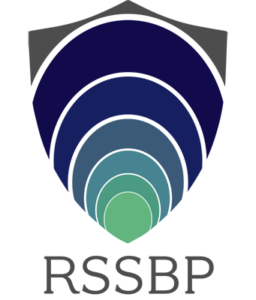
PROGRAM OVERVIEW
Shellfish disease introduction is a concern for shellfish farmers, fishers, and resource managers worldwide. At the center of the rapidly expanding shellfish culture footprint is the hatchery production of seed. Interstate seed transfers, crucial for industry growth, are currently regulated by individual states, but shellfish disease distributions do not follow state boundaries. The purpose of the RSSBP is to facilitate the process for permitting interstate commerce of biosecure bivalve shellfish seed and larvae being sold directly out of hatchery facilities. The RSSBP Core Elements provide a science-based pathway to improved biosecurity.
WE PROVIDE TOOLS TO:
Evaluate and reduce risks of transfers | Inform decision making regarding interstate seed transfer
Enhance biosecurity from hatchery to farm | Facilitate commerce
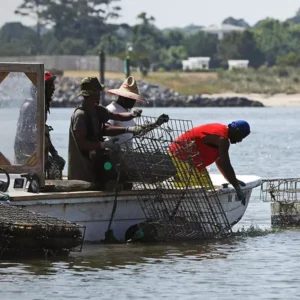
FOR GROWERS
- Make informed seed sourcing decisions by using the shellfish disease mapper tool and list of RSSBP-compliant hatcheries.
- Reciew and implement the biosecurity best management practices for your farm.
- Learn more about the common shellfish diseases and what to do if there is unusual mortality on the farm.
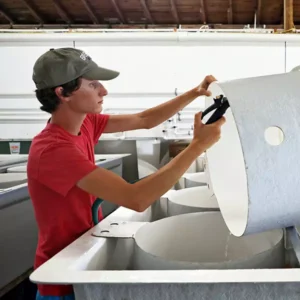
FOR HATCHERIES
- Commit to improving shellfish biosecurity in your facility by following the RSSBP Best Management Practices
- Apply to become a BMP-compliant facility
- Use the tools to support and document your facility risk management.

FOR REGULATORS
- Use the Shellfish Disease Database Tool to understand disease distribution in wild populations relevant to shellfish transfer requests.
- Streamline permit reviews by recognizing BMP-compliant hatcheries.
- Seek advice on transfer risk levels from the Regional Shellfish Health Advisory Council.
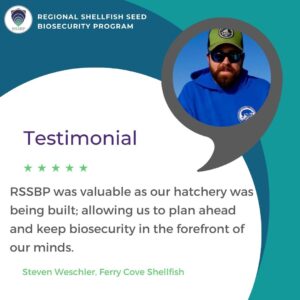
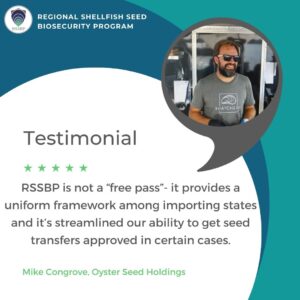
BACKGROUND
Shellfish disease and disease introduction is a concern for shellfish farmers, commercial harvesters, and resource managers worldwide. Often, the spread of disease has been associated with the transfer of shellfish stocks. The growth of shellfish aquaculture on the East Coast of the U.S. has long relied on the hatchery production of seed. There are approximately 50 hatcheries along the East Coast and interstate transfers are fundamental to regional commerce and production.
Each state within the region has policies or regulations regarding seed importations. Most require health evaluation and careful review of each shipment batch proposed for importation. This process is time consuming and costly.
Research continues to demonstrate that there is little risk of disease transfer associated with young/small seed that has been maintained on filtered water in the hatchery. Based on this evidence, the RSSBP has been working to develop tools and programs to streamline interstate commerce of hatchery seed, in the belief that incentivizing commerce in these typically disease-free products will foster enhanced biosecurity through the broader regional industry.
- Safi, L.S.L., McGurk, E. S., Carnegie, R.B., and Bushek, D. (2025 online/in press) The biosecurity of bivalve seed transfers during different life stages with respect to their pathogens. Aquaculture. 606 article 742548. https://doi.org/10.1016/j.aquaculture.2025.742582
CORE ELEMENTS
Hatchery Compliance Program
Hatchery products pose the lowest disease risk due to their young age especially those only exposed to filtered water. Starting here, the Program outlines a voluntary compliance process for hatcheries to improve and validate biosecurity, reducing the need for individual batch disease certifications. State participation may require changing laws, policies or other regulations before taking advantage of this Program.
Interactive Shellfish Disease Database Mapping Tool
Provides science-based information on the distribution and abundance of shellfish pathogens along the East Coast of the United States in a manner that allows informed decisions regarding the risks of spreading or exacerbating disease from shellfish transfers.
Regional Shellfish Health Advisory Council
A team of molluscan scientists/pathologists, State regulators, extension personnel and industry members to support the RSSBP and relevant stakeholders by providing science-based advice on shellfish transfers and overseeing the hatchery certification/compliance process.
Regional network of shellfish pathologists
A team of experts to improve the perspective on disease distributions and risk, expand surveillance activities in areas where data are lacking, and ensure proficiency in diagnosis to support a growing aquaculture industry.
